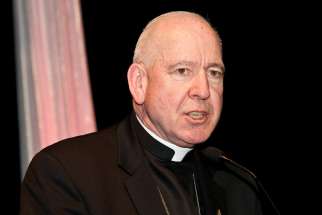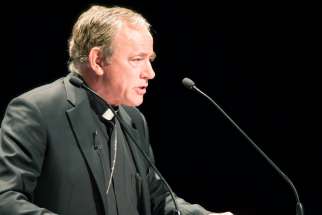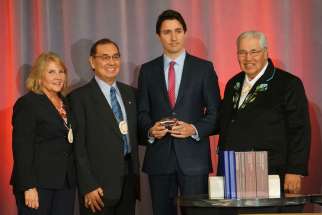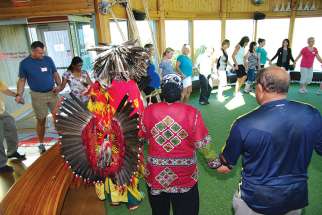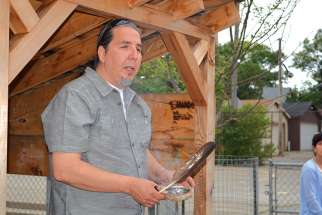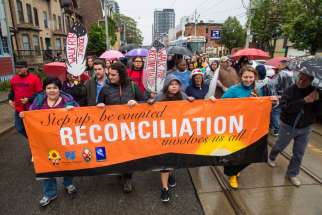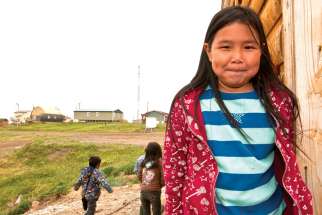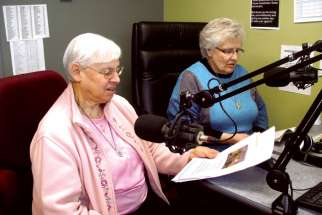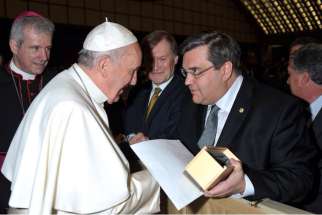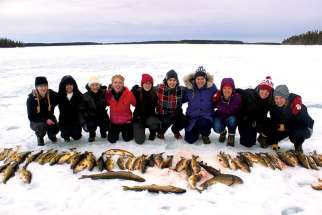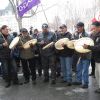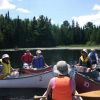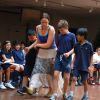Church did not ‘weasel’ out of residential school settlement
A $21-million shortfall on a $25-million fundraising campaign was a fiasco, but it wasn’t an attempt to weasel out of the legal or moral obligations Catholics have in the wake of the residential schools tragedy, Grouard-McLennan Archibishop Gerard Pettipas told The Catholic Register.
OTTAWA – Canadians Catholic bishops, Catholic organizations and pro-life groups are concerned about the Liberal government’s assisted suicide Bill C-14, especially given the tragedy at Attawapiskat.
Stand and deliver
The real tragedy surrounding a suicide crisis that has devastated a remote Manitoba community is that it represents just the latest instalment in a Canadian saga that shows no sign of a final chapter.
Catholic universities take next step in Truth and Reconciliation
The Truth and Reconciliation process examining past wrongs done to Canada’s First Nations people may be complete, but for Catholic universities the time to respond to the TRC’s “Call to Action” has just begun.
Understanding the past to build for the future
TORONTO - Clayton Shirt speaks bluntly when it comes to past treatment of First Nations people by the Catholic Church and Canada.
Liberals’ Throne Speech highlights First Nations’ agenda
OTTAWA - In addition to bringing 25,000 Syrian refugees to Canada and contributing to COP21 climate change talks in Paris, the new Liberal government of Justin Trudeau is forging ahead on an ambitious agenda regarding First Nations
Truth and Reconciliation positive for First Nations
Although a national poll showed Canada appears divided on the value of the Truth and Reconciliation Commission, Catholic Church leaders said a positive impact has already been felt among native communities.
Long way to go to First Nations’ reconciliation
The truth is we’re not reconciled, even as the Truth and Reconciliation Commission concludes its five-year inquiry into the legacy of 150 years of Indian residential schools with the release next week of its final report.
Approximately 800 km northwest of Yellowknife in the Northwest Territories is Fort Good Hope, a remote, mostly First Nations community through which the mighty Mackenzie River flows on its way to the Arctic Ocean.
Montreal mayor invites Pope to city's 375th anniversary in 2017
MONTREAL - Pope Francis has been invited to Montreal in 2017 to participate in celebrations marking the city’s 375th anniversary.
Rotaract partners with First Nations peers
First Nations’ MP seeks to amend Indian Act
While Idle No More protests and blockades continue sporadically across Canada, the Conservatives’ Aboriginal Caucus chair is busy tackling the outdated Indian Act.
Fresh vision needed in First Nations’ relations
OTTAWA - With the First Nations’ Idle No More protests showing no sign of running out of steam, some observers urge a fresh vision for the relationship between Canada and its aboriginal peoples.
Northern community to empower native youth
Fr. David Shulist is inviting First Nations youth to strengthen the good aspirations and desires that already exist within them.
The Working to Empower Youth program will launch in January from the Anishinabe Spiritual Centre in Espanola, Ont., where Shulist is director. WEY has been a year in the making and was created in response to concerns from native communities, especially the Sagamok community, that youth are lacking spirituality and direction.
Elders, parents and teachers are “recognizing that there’s alienation and despair between the youth and the members of the community, especially at the level of their spirituality, at the level of their religious teachings,” said Shulist. “Religion is not popular in the world today, especially in the Western world, so this has compounded in the communities as well.”
Beginning with 12- and 13- year-olds, Shulist says the “hope is that they could have an avenue with which they would be able to invite and encourage and help young people to be able to participate in discovering their spiritual roots, their spiritual traditions, both the Anishinabe and Christian, and this could be a program that could do that.”
The teens will engage in community oriented activities, such as learning how to build a sweat lodge, under the guidance of an elder. The theme could be one of forgiveness and reconciliation.
A sense of community is one of the values Shulist hopes to instill. Staff from the centre, elders and teachers will take leading roles. This is a “program that is very much of a partnership with the centre and a community. It’s not the community coming to us saying you run a program,” Shulist said. With modern culture promoting individualism, “The (program’s) core value would be the communal value. They are a part of the community, a collective,” said Shulist. “A person is never defined as an individual alone. They are always part of a set of relationships. So to instill this realization, this understanding, this awareness that they belong to a communal reality.”
Shulist also hopes the program will instill in the teens a sense of honour for the gifts of the Holy Spirit, the value of empowerment, the virtue of patience, rights of passage and the importance of being a source of inspiration, among others. He wants the youth to know they have the power “to make a difference, to choose what is good and to perpetuate the good.” And in the process, he wants to incorporate into the program the fact that the youth are close to nature.
“If I were to promote it to you as a 12-year-old,” said Shulist, “I would want to know what desires have you got, what are your hopes. I’d want to know, who are you? Who do you hope to be? Who are people that you look up to?”
His hope is that participants will discover themselves and be aware that there are institutions within their community, such as those relating to health care, that they can contribute to one day.
Shulist also hopes the program will receive financial support from the wider Catholic community. And if WEY proves to be successful, he plans on expanding it beyond the Manitoulin North Shore district and include youth up to ages 17 and 18.
Toronto students celebrate aboriginal culture [w/ audio]
TORONTO - Some 75 staff, students and parents were treated to a day of aboriginal music and dancing as the Toronto Catholic District School Board celebrated National Aboriginal Day June 21.
"We invited some aboriginal people to celebrate with them and to demonstrate some of the celebrations as part of their culture," said Bruce Rodrigues, TCDSB's director of education. "It's important to acknowledge (aboriginal culture) so that our students can have an understanding of the diversity that we have within the system."
National Aboriginal Day has been celebrated in Canada since 1996 to recognize, celebrate and preserve the unique aboriginal cultures while acknowledging their contributions to contemporary Canada.


